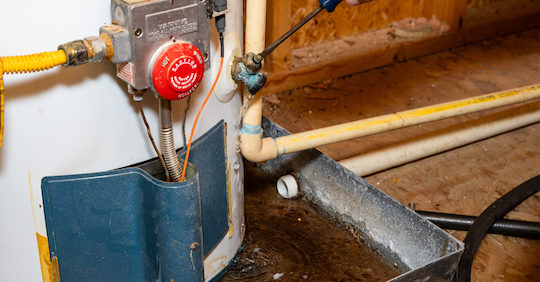Quick Summary
Water heaters under 8 years old with minor issues like faulty thermostats or heating elements can usually be repaired for $150 to $500, while units over 10 to 12 years old showing rust, corrosion, or frequent breakdowns should be replaced at a cost of $1,200 to $3,500. Conventional tank heaters last 8 to 12 years, while tankless systems can operate for up to 20 years with proper maintenance. Upgrading to a high-efficiency model can reduce utility costs since water heating accounts for nearly 18% of a home’s total energy use.
Key Takeaways
- Replace your water heater if it is 10 to 12 years old or older, especially if it shows visible rust, corrosion, or has required multiple repairs in the past year.
- Repair minor issues like faulty thermostats or heating elements on systems under 8 years old, as these fixes typically cost less than $300 and can extend the unit’s life.
- Budget between $1,200 and $3,500 for water heater replacement depending on size, type, and fuel source, with modern high-efficiency models offering long-term utility savings.
- Flush your tank annually and check the anode rod every two to three years to prevent sediment buildup and extend system lifespan, especially in hard water areas.
Hot water is something most people don’t think about until it’s gone. From showers and laundry to cleaning dishes, your water heater keeps daily life running smoothly. When it stops working properly, one of the most common questions homeowners in Riverside County ask is: should I repair my water heater or replace it?
The answer depends on the unit’s age, condition, and repair history. Understanding the signs of failure, typical lifespan, and cost differences can help you make the most cost-effective and practical decision for your home. At 5 Star Plumbing, we’ve helped countless homeowners across the county diagnose and resolve water heater problems of every kind. With years of hands-on experience, we understand how to spot the difference between a simple fix and a system that’s ready to be replaced. Our licensed plumbers provide honest assessments, quality workmanship, and lasting solutions to restore reliable hot water safely and efficiently.
Why Water Heater Decisions Matter
A reliable water heater is essential for comfort, convenience, and hygiene. When problems appear, it’s not just about hot water. Issues can affect your plumbing system, water quality, and monthly utility costs. Local water hardness in areas like Riverside and Hemet can also shorten the life of your system if it isn’t properly maintained.
Common Signs Your Water Heater Is Failing
Recognizing early warning signs of water heater failure can help you avoid sudden breakdowns and costly damage.
Common symptoms include:
- No hot water or fluctuating temperature
- Leaks or pooling water around the tank
- Strange noises such as rumbling, popping, or banging
- Discolored or rusty water
- Reduced water pressure
Leaks or pooling water around the base might not always mean the tank has failed. Nearby plumbing issues often require professional leak detection to locate the true source. In some homes, water near the heater can actually come from a foundation issue such as a slab leak, not the heater itself.
Average Lifespan: Tank vs. Tankless Water Heaters
The average lifespan of a water heater depends largely on the type and how well it’s maintained.
- Conventional tank heaters usually last between 8 and 12 years.
- Tankless systems can operate for up to 20 years with proper maintenance.
Regular care such as annual flushing, inspecting the anode rod, and scheduling professional service can significantly extend the life of your unit.
When a Simple Repair Fixes the Problem
Not every issue means you need a new water heater. In many cases, a quick repair can restore hot water and extend the system’s life.
Common repairable problems include a faulty thermostat, heating element, or pilot light. These are often minor fixes that cost less than $300, depending on the part and labor. For newer systems under eight years old with no signs of corrosion, expert water heater repair can be an affordable and effective solution.
When Replacement Is the Smarter Choice
There comes a point when replacing your water heater makes more financial sense than continuing to repair it.
Consider replacement if:
- The tank is over 10 to 12 years old
- You’ve needed several repairs in the past year
- There is visible rust or corrosion inside or outside the tank
- Energy bills are rising due to low efficiency
If your tank is over a decade old or showing rust and corrosion, professional water heater installation ensures your new system meets modern safety and efficiency standards.
Sometimes the issue extends beyond the water heater itself. If corrosion spreads into your plumbing lines, piping and repiping may be needed before installation. Hidden pipe leaks can also affect heater performance and should be repaired before connecting a new system.
Repair vs. Replacement: Cost Comparison
Understanding cost differences helps clarify the repair-or-replace question.
- Repairs: Typically range from $150 to $500, depending on parts and labor.
- Replacements: Generally range from $1,200 to $3,500, depending on size, type, and fuel source.
While replacement is a higher upfront cost, modern high-efficiency models often lower utility bills and require less maintenance, saving money over time. Homeowners who upgrade from a traditional tank to a high-efficiency or tankless system can also benefit from longer lifespan and fewer emergency repairs. According to the U.S. Department of Energy, water heating makes up nearly 18% of a home’s total energy use, so upgrading to a more efficient system can lead to noticeable savings over time.
Choosing the Best Water Heater for Your Home
The right replacement depends on your home’s size, energy source, and water demand.
- Tank vs. Tankless: Tank units store hot water for immediate use, while tankless heaters heat water on demand, saving energy and space.
- Gas vs. Electric: Gas models often heat water faster, while electric units can be easier to install and maintain.
- Home considerations: Families, rental properties, and long-term homeowners each have different efficiency and budget needs.
Our team can help assess your household’s water usage and recommend the best system for your home and lifestyle.
Maintenance Tips to Extend Water Heater Life
Routine care can prevent expensive problems and extend your system’s lifespan.
- Flush the tank once a year to remove sediment buildup
- Check the anode rod every two to three years
- Test the pressure relief valve and inspect all connections
- In areas with hard water, consider professional water treatments to reduce mineral buildup
- Schedule annual maintenance for inspection and tune-ups
These steps help your system run efficiently and reduce the risk of sudden breakdowns.
Final Thoughts: Repair or Replace?
Deciding whether to repair or replace your water heater depends on age, performance, and condition.
Here’s a quick guide:
- Repair: Under 8 years old, no corrosion, and minor issues like a thermostat or heating element
- Replace: 10 to 12 years old or older, visible rust, or frequent repairs
- Upgrade: If you’re interested in long-term energy savings and improved performance
A professional inspection is the best way to determine which option makes the most sense for your situation. Schedule a water heater inspection with 5 Star Plumbing to get an expert opinion and a clear, honest recommendation for your home. With offices in Riverside and Hemet and service available throughout Riverside County, our licensed team is ready to restore your hot water quickly and safely.
Transitioning from this decision can bring up other questions homeowners often have about cost, lifespan, and performance. The FAQs below answer some of the most common ones.
Frequently Asked Questions
Is it worth repairing a 10-year-old water heater?
Often not. If a tank-style heater is 10 to 12 years old and showing leaks, rust, or frequent problems, replacing it is usually more cost-effective and safer.
How much does it cost to replace a water heater in Riverside County?
Most replacements cost between $1,200 and $3,500, depending on the heater type, installation complexity, and local permit requirements.
What are the signs my water heater is failing?
- No hot water
- Fluctuating temperatures
- Leaks or pooling near the base
- Rumbling or popping noises
- Rusty or discolored water
- Reduced pressure
Do tankless water heaters really last longer?
Yes. With proper maintenance, tankless units can last up to 20 years, while traditional tanks typically last about half that time.
Can hard water shorten my water heater’s lifespan?
Yes. Hard water causes mineral buildup that leads to inefficiency and wear. Installing professional water treatments and scheduling regular flushing can protect your heater.


